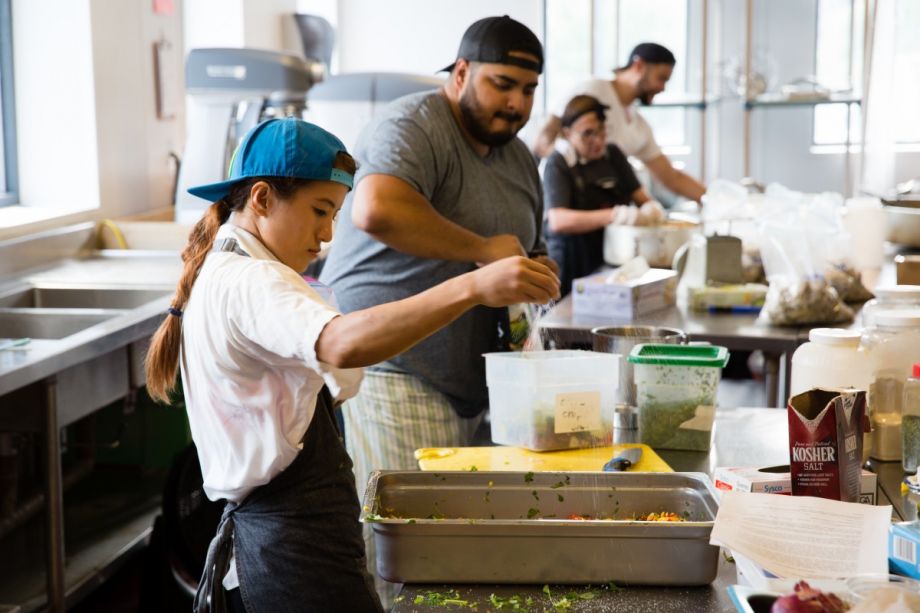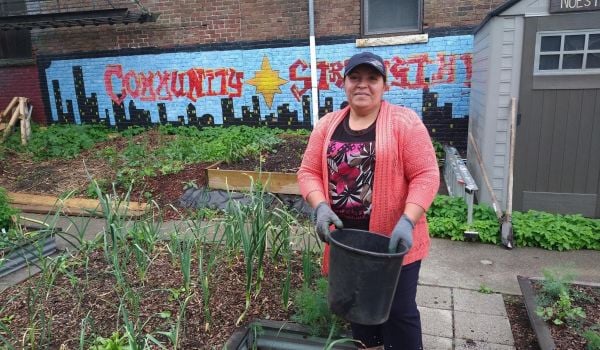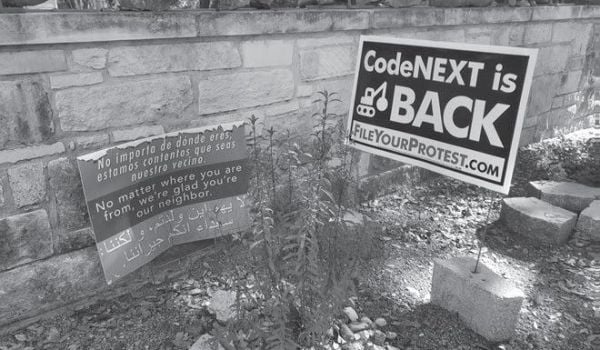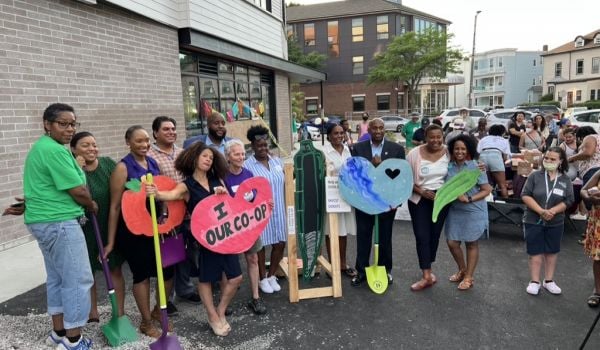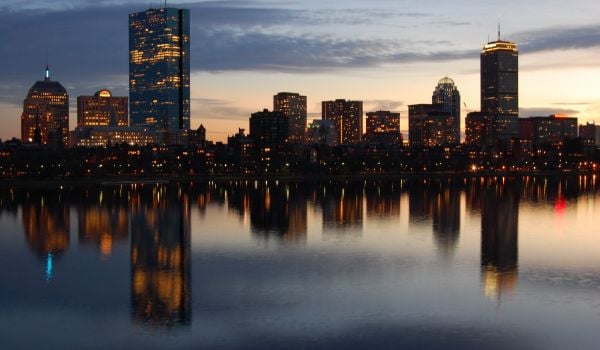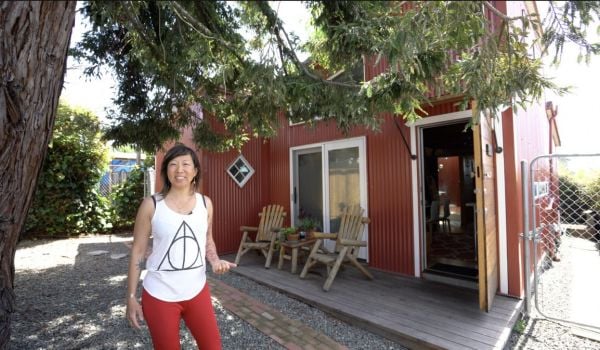When Jen Faigel finally held that $2.5 million check for a loan from the City of Boston in her hands, it symbolized so much more to her than its face value. “It felt shocking,” Faigel says. “I had somebody on my team pick it up at city hall because we didn’t want it to get stuck in the mail. And we wanted to get it as quickly as we could into our bank account. It’s signed by the current mayor, Mayor Michelle Wu.”
First and foremost, it represented the vision and aspirations of the Dorchester and Roxbury neighborhoods that surround CommonWealth Kitchen where Faigel works as executive director. The nonprofit took ownership of the property, a former meat processing plant, in February at a price tag of $7 million, paid for in part with that check.
More than half of Boston’s Black residents live in Dorchester and Roxbury — a legacy of historic racial segregation and ongoing redlining. Around a decade ago, Dorchester Bay Economic Development Corporation acquired the property from a local family-owned meat processing company. The initial plan was to convert the plant into affordable housing. But the neighbors said that they actually needed jobs and economic development. So Dorchester Bay brought in CommonWealth Kitchen as the anchor tenant.
The check also represented validation for a model of community economic development that’s emerged over the past decade or so. Like the recipes the Kitchen’s staff follow when mass-producing sauces, juices and other products, the recipe for financing the re-development of this former hot dog plant is theoretically possible for others to emulate, though maybe with slightly different ingredients.
That $2.5 million check also represented a nexus of relationships across Boston. As a former affordable housing developer, Faigel’s relationships go back decades with staff at Boston’s Department of Neighborhood Development, which underwrote the $2.5 million loan. It’s a deferred loan, meaning CommonWealth Kitchen doesn’t have to make any payments until the loan matures in 10 years, at which point the city may forgive all or part of what’s owed.
CommonWealth Kitchen members have also built relationships with area universities and hospitals, and the businesses it has incubated now supply various products to those universities. “We’ve gotten to where we are in part from reputation, doing good work, being consistent and telling our story,” Faigel says. With 50 companies [incubated so far], we’re a story factory. You can gain a reputation almost like too big too fail; you can be too important to let fester.”
As covered previously by Next City, CommonWealth Kitchen is a hybrid organization, combining a food business incubator, shared commercial kitchen space and a co-packing facility that now employs 16 people on a living wage or higher — currently $15.87 per hour for Boston. When it moved into the former hot dog plant in 2014, no one knew if such a model could succeed. There weren’t any precedents across the country that combined all these components.
There was talk back in 2013 of CommonWealth Kitchen someday acquiring the property, but that could not happen for at least seven years. That’s because a large piece of the financing for Dorchester Bay to acquire and rehab the property came from the federal New Markets Tax Credit program, which requires that the ownership structure of a building stay in place for at least seven years after the transaction closes — which technically happened when Dorchester Bay acquired the property in 2013.
In 2020, Dorchester Bay went through the process of “unwinding” the New Markets Tax Credit ownership structure, clearing the way to begin talking seriously about selling the building to CommonWealth Kitchen.
“This sale is part of the success story,” says Beth O’Donnell, director of real estate at Dorchester Bay Economic Development Corporation. “If Dorchester Bay wants to build equity in the community, part of that equity is community ownership over the real estate.”
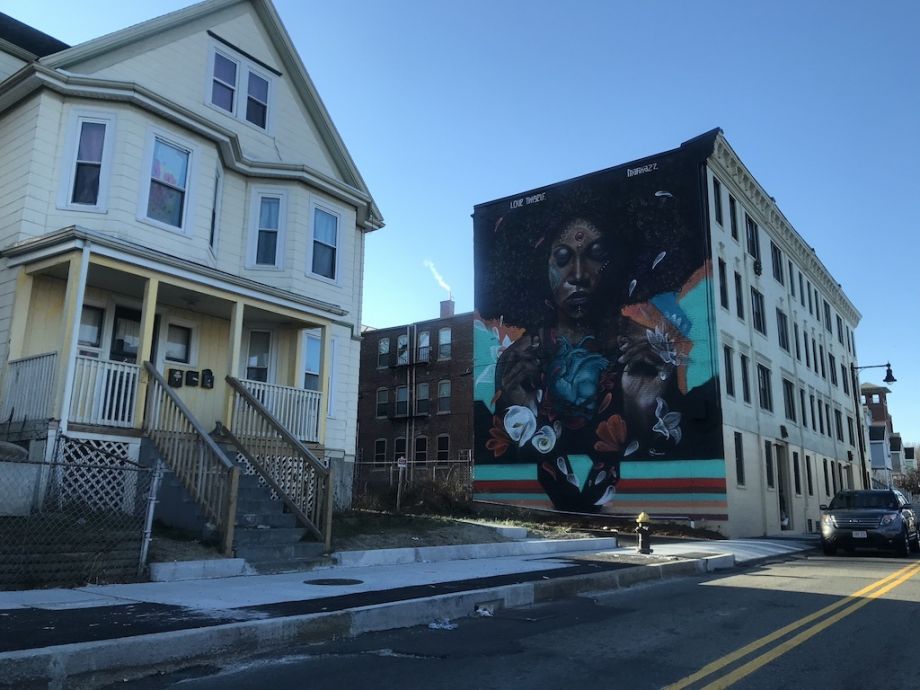
A view of the mural across the street from CommonWealth Kitchen. (Photo by Oscar Perry Abello)
Others across the country have been finding ways to use the New Markets Tax Credit program with similar results in mind.
In San Francisco, the Community Arts Stabilization Trust used New Markets Tax Credits to renovate two buildings it plans to sell to the community-based arts organizations that are currently leasing the spaces. It’s already inspiring copycats, including Seattle’s Cultural Space Agency.
In New York City, nonprofit consultancy Hester Street Collaborative has taken a different approach by helping grassroots organizations like Make The Road New York navigate the complex New Markets Tax Credit program to acquire and build its new permanent home in Queens without having to work with a real estate developer. However, critics point out the high cost of the necessary legal, accounting and consulting work for New Markets Tax Credit deals.
Another quirk is the annual limitation – nationwide, Congress has authorized just $5 billion a year for the New Markets Tax Credits program. There’s almost always more demand for the financing than there is to go around, meaning these kinds of economic development projects chronically need to layer in more financing sources on top of this already complicated financing source.
In addition to the New Markets Tax Credit Financing, Dorchester Bay Economic Development Corporation got a low-cost, long-term $3.2 million loan via the Department of Housing and Urban Development’s Section 108 loan guarantee program.
The Section 108 program’s advantages include being very flexible and low cost since the borrowing originates directly from the department, and borrowing terms are up to 20 years. The program’s main disadvantage is that few people know about it.
“My experience with Section 108 is that cities and counties that have figured it out, use it,” says Brett Theodos, senior fellow at the Urban Institute. “But it remains a well-kept secret within the federal government.”
Section 108 allows states or eligible local governments to use the cash flow from annual Community Development Block Grants as collateral for the loans. The loan proceeds can go out to projects as grants and the borrowing government can pay back the loans using block grant funds or other funds over time, or it can re-lend those funds to eligible projects or businesses, and the repayments for those loans get funneled to repay the original Section 108 loan.
“Local governments can use Section 108 to deploy capital to riskier projects,” Theodos says. “But you are to some degree jeopardizing your future Community Development Block Grant spending by using it, so you want to be wise with it.”
Section 108 projects remain well below their potential capacity. All 50 states plus around 1,250 city or county governments are eligible for Section 108 loans. Under Section 108, HUD allows each state or eligible local government to borrow up to five times what they each receive annually from the Community Development Block Grant Program, minus any active Section 108 loans from previous years.
Altogether, according to HUD records, eligible units of government were eligible to borrow up to $10.1 billion via the Section 108 program in 2021. How much did they actually borrow? $80.6 million, according to HUD’s Section 108 records.
That’s no outlier because of pandemic conditions. From 2015 to 2019, according to HUD records, eligible units of government only borrowed an average of $73 million a year in Section 108 loans.
Even in Boston, usage of the program is very rare.
“I’ve been involved in other projects around Boston that have struggled to attract debt capital for affordable commercial space,” says O’Donnell at Dorchester Bay Economic Development Corporation. “When it’s come up to the city, the answer has almost always been no. It doesn’t seem like the city has Section 108 on its fingertips.”
But the Section 108 funding was crucial for CommonWealth Kitchen because of its favorable terms and flexibility.
Serving as the intermediary for the $3.2 million Section 108 loan, the city was able to roll over the outstanding debt directly to CommonWealth Kitchen as part of the $7 million acquisition. In other words, Dorchester Bay still owed 100% of the principal as of February this year, but instead of making Dorchester Bay repay it with cash obtained from the sale, the city simply transferred the debt from Dorchester Bay to CommonWealth Kitchen.
“It’s probably the best we could realistically do,” Theodos at the Urban Institute says. “It’s not ideal because a high-capacity place like Boston is able to put this together but smaller cities, rural places, even other disinvested highly urbanized places are just not able to navigate these processes.”
The bottom line is that CommonWealth Kitchen went from paying $22,000 a month in rent at the start of 2022 to zero in debt servicing costs for one year, then $12,000 in total monthly debt payments after that.
That’s a recipe for financing the re-purposing of former manufacturing space according to the vision and dreams of a historically redlined community around it. Not perfect, but it’s a recipe nonetheless.
Dorchester Bay Economic Development Corporation isn’t profiting from the sale — it’s getting some cash and taking some debt off its balance sheet. However, it ultimately put millions more into the building than it’s getting back in those terms.
But that may be okay. Dorchester Bay wasn’t expecting to profit financially from the transaction. Over time, the economic benefits to the surrounding community are likely to exceed the millions that Dorchester Bay put into the property. Those benefits are hard to measure or fully capture, but with CommonWealth Kitchen taking ownership of the property and gaining momentum with its intentional model, it’s more likely than ever that Dorchester Bay’s calculation will work out as expected if it hasn’t already.
Others don’t have to follow this same exact pathway. It’s not necessarily possible everywhere. But as for the idea that economic development doesn’t have to depend on developers extracting profits, there’s a victory here using some ingredients that could be available elsewhere.
“The opportunities aren’t that frequent to do something like this,” O’Donnell says. “In part, it’s because of the landscape of tools to finance it, but also compounded in Boston by the [lack] of land and other assets. In 90% of cases, we’re competing with private developers for land and site control. It makes it even more important when you do get these opportunities, you maximize their impact.”
This article is part of The Bottom Line, a series exploring scalable solutions for problems related to affordability, inclusive economic growth and access to capital. Click here to subscribe to our Bottom Line newsletter.

Oscar is Next City's senior economic justice correspondent. He previously served as Next City’s editor from 2018-2019, and was a Next City Equitable Cities Fellow from 2015-2016. Since 2011, Oscar has covered community development finance, community banking, impact investing, economic development, housing and more for media outlets such as Shelterforce, B Magazine, Impact Alpha and Fast Company.
Follow Oscar .(JavaScript must be enabled to view this email address)



